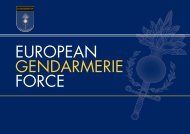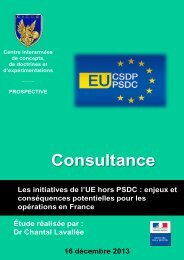Conference
science-research-bulletin-2013-conference
science-research-bulletin-2013-conference
Create successful ePaper yourself
Turn your PDF publications into a flip-book with our unique Google optimized e-Paper software.
EUROPEAN POLICE SCIENCE AND RESEARCH BULLETIN<br />
SPECIAL CONFERENCE EDITION<br />
availability of resources to expand a modern<br />
and efficient security infrastructure, which<br />
allows for increased security while requiring<br />
decreased levels of policing. Additionally, major<br />
events allow for the introduction of systems<br />
and practices, procurement of equipment<br />
and expertise, development of training and<br />
expansion of capacity in a manner that is<br />
innovative and meaningful. In this way, they<br />
provide a legacy of development in national<br />
security planning practices and structures, as<br />
well as new forms of thinking in response to<br />
emerging threats to national security, and the<br />
furtherance of international cooperation among<br />
security planners.<br />
Having identified major events as an area in need<br />
of international coordination, UNICRI launched its<br />
global programme on major events in 2002. This<br />
programme has subsequently received express<br />
backing from the United Nations Economic and<br />
Social Council (Ecosoc) Resolution 2006/28, in<br />
which the Council invited UNICRI to continue<br />
and expand its work in this area and invited<br />
Member States to request UNICRI’s assistance for<br />
the security planning of major events.<br />
Throughout UNICRI’s work, a common thread is<br />
the focus on activities at regional level. This stems<br />
from the recognition that programmes and<br />
projects implemented among countries of similar<br />
social, political, and economic backgrounds and<br />
institutional frameworks can be carried out more<br />
effectively and the legacy of success can be seen<br />
throughout the region.<br />
Based on this approach, the project EU-SEC was<br />
initiated by UNICRI in 2004, as the first regional<br />
platform for the coordination of security during<br />
major events in Europe.<br />
EU- SEC AND EU-SEC II<br />
EU-SEC, which involved 10 EU Member States ( 1 ),<br />
was funded by the European Commission’s<br />
6th framework programme — DG Enterprise<br />
and Industry. It was aimed at supporting and<br />
coordinating national research activities related to<br />
security during major events. EU-SEC pioneered<br />
a common methodology for the coordination of<br />
national research programmes on security during<br />
major events at European level. In addition, the<br />
project developed research on police ethics and<br />
public private partnerships during the planning of<br />
major events, and it identified thematic priorities<br />
for future research activities (all of which would<br />
later be built upon in EU-SEC II, described in the<br />
next paragraph). Furthermore, by establishing a<br />
coordination platform of end-users, EU-SEC laid<br />
the foundations for the creation of ‘The European<br />
House of Major Events Security.’<br />
Based on this success, the follow up project, EU-<br />
SEC II, was launched in 2008, now involving 22<br />
Member States ( 2 ). EU-SEC II identified key areas<br />
of security planning for major events which<br />
required further coordination. On the basis of this,<br />
a number of standards and priorities for future<br />
research ( 3 ) were defined and/or elaborated.<br />
These are split into two main groups: ‘Established<br />
Standards’ and ‘Tools for Development.’<br />
The project elaborated established standards in<br />
relation to four areas:<br />
• The IPO ( 4 ) Security Planning Model: A security<br />
planning blue print that can be tailored to<br />
each country’s specific needs.<br />
• Public Private Partnerships (PPPs): Guidelines<br />
for assessing, establishing and utilising PPPs.<br />
• Media Management: Guidelines for Police and<br />
security planners in general on the cultivation<br />
and management of symbiotic relationships<br />
with the media.<br />
( 1 ) The Member States of EU-SEC were Austria, Finland, France, Germany, Ireland, Italy, Portugal, Spain, the Netherlands and<br />
the United Kingdom.<br />
( 2 ) The Member States of EU-SEC II were Austria, Bulgaria, Cyprus, Denmark, Estonia, Finland, France, Germany, Greece,<br />
Hungary, Ireland, Italy, Latvia, Malta, the Netherlands, Portugal, Romania, the Slovak Republic, Slovenia, Spain, Sweden and<br />
the United Kingdom.<br />
( 3 ) Further information on these standards can be found in EU-SEC II Consortium (2011).<br />
( 4 ) UNICRI launched the International Permanent Observatory (IPO) on Security Measures during Major Events in 2003. In<br />
2007, within the framework of the IPO, The IPO Security Planning Model was published as a model of best practice in<br />
security planning to assist planners in their daily work and to unite national approaches in the planning of security for major<br />
events. The IPO was formally acknowledged for its efforts by the United Nations Ecosoc Resolution E/2006/28 of July 2006.<br />
135





